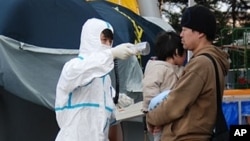Explosion at the Fukushima nuclear plant
Japanese authorities are struggling to prevent a disaster at a second nuclear reactor damaged in Friday's massive 8.9 magnitude earthquake. Authorities say at least 19 people have been exposed to radiation and more than 160 others may have been.
Radiation readings 400 times higher than normal levels were detected in Miyagi prefecture (state) for about 90 minutes Sunday afternoon. An electric power company that made the announcement, however, describes the danger as "very low." It attributes the emissions to a deliberate venting of radioactive substances from a damaged nuclear plant to the south, here in Fukushima prefecture.
This is where authorities are fighting to control overheated reactors, injecting sea water into them to reduce internal pressure.
An industry veteran in Japan, who spoke with VOA News, says the reactors suffered serious damage after tsunami waves swamped electrical lines and emergency water storage tanks that are critical for the cooling process.
Central government officials also warn a second reactor at the Fukushima plant could suffer an explosion similar to the one that occurred at the Number 1 reactor Saturday.
Government and industry officials say the two reactors are likely to be permanently out of commission.
Japan's top government spokesman says further reactor explosions will pose no risk to the 170,000 residents already evacuated from a 20-kilometer radius around the power generation facility.
Makeshift emergency centers have been set up to screen those coming out of the danger zones.
A disaster relief official wearing a respirator, who does not want to be named, explained that 1,500 people have been screened since Saturday in this municipal building parking lot in Koriyama.
Evacuees who are deemed radiation free then are sent to shelters where they get bottled water and rice balls supplied by Red Cross volunteers.
Takashi Oohata was sent to a shelter with seven relatives. They are sharing a floor with 1,800 other evacuees.
Oohata says the Japanese government needs to ensure they receive adequate food and water and are safely able to return to their homes as soon as possible.
None of the officials on site could predict when an all-clear signal would come. In the meantime Japan plans to distribute pills to prevent radiation poisoning.
Besides the concern about the spread of radiation, the loss of reactors here in Fukushima prefecture is going to be felt in another way across much of eastern Japan. Power companies say there will be rolling blackouts as the lost capacity means Japan faces an unusual shortage of electricity.





